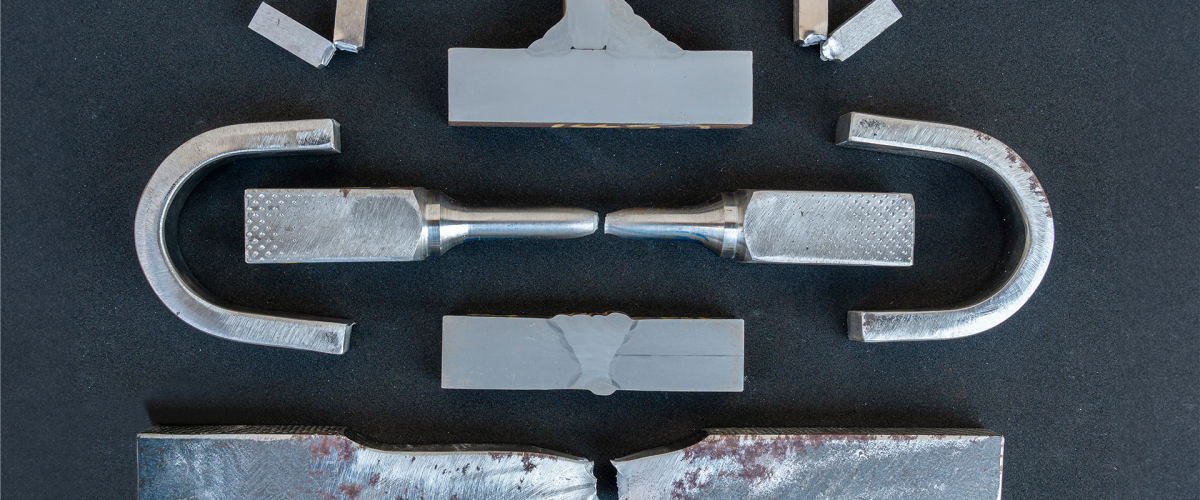Within the broad field of material testing, Universal Testing Machines (UTMs) have become an integral tool, serving many industries by verifying the integrity and performance of materials. Currently, the market offers a large selection of UTMs, each featuring distinct characteristics designed to meet different laboratory requirements. There are plenty to offer: electromechanical, servo-hydraulic, static-hydraulic, to table-top, portable, and custom UTMs. Nevertheless, two types stand out due to their widespread adoption and robust capabilities: electromechanical and servo-hydraulic Universal Testing Machines.
Electromechanical and servo-hydraulic UTMs are the most popular choices because of their precision, efficiency, and capability to handle a large number of testing protocols. Electromechanical UTMs are known for their precise control and repeatability in tensile and compression tests at lower force ranges. On the other hand, Servo-Hydraulic UTMs offer superior performance in high-load applications and dynamic testing environments where the material behavior needs to be evaluated under changing loads and frequencies.
The main goal of this article is to compare electromechanical and servo-hydraulic Universal Testing Machines. We will discuss the advantages and disadvantages of each type, review the most common uses, and analyze the nuances that distinguish these two prominent variants. The analysis of their operational principles, application areas, and the technological nuances that define their functionality aims to provide a comprehensive understanding of which UTM variant might best suit specific testing requirements.
Understanding Universal Testing Machines (UTMs)
Before discussing in more detail the comparative analysis of electromechanical and servo-hydraulic UTMs, let us take time to refresh our understanding of what a Universal Testing Machine is and what its role is in material testing.
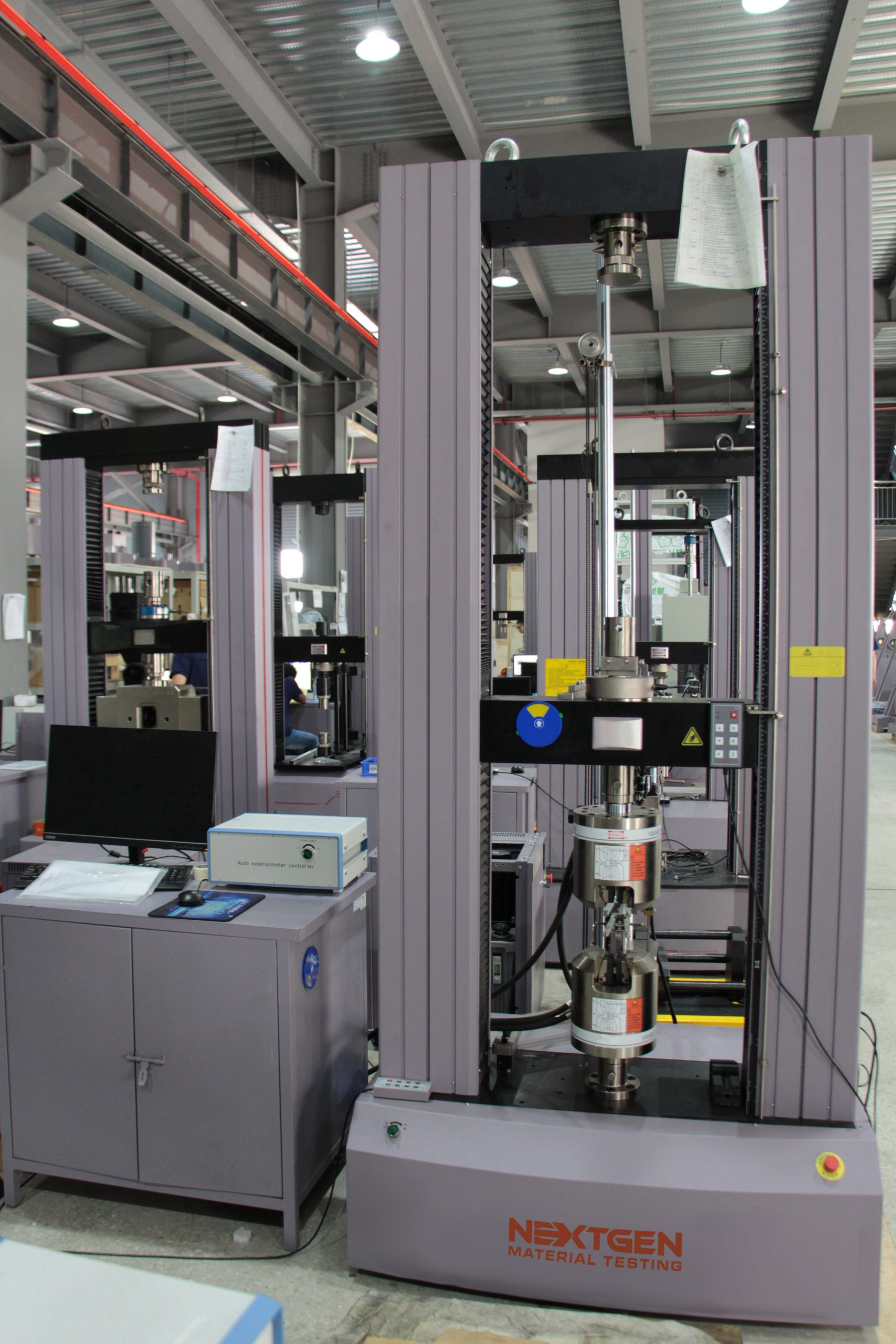 A Universal Testing Machine, also known as a materials testing machine, is an indispensable tool designed to test materials’ mechanical properties. Its capabilities include assessing tensile strength, compressive strength, flexural strength, and other critical mechanical parameters. UTM’s versatility allows it to perform a range of standard tests on materials, components, and structures. This justifies its “universal” name. This flexibility makes it a valuable tool for research and quality assurance.
A Universal Testing Machine, also known as a materials testing machine, is an indispensable tool designed to test materials’ mechanical properties. Its capabilities include assessing tensile strength, compressive strength, flexural strength, and other critical mechanical parameters. UTM’s versatility allows it to perform a range of standard tests on materials, components, and structures. This justifies its “universal” name. This flexibility makes it a valuable tool for research and quality assurance.
Universal Testing Machines are instrumental to both product development and regulatory compliance, providing valuable data that helps engineers and designers create safer and more durable products.
By simulating different conditions under which materials and components might be stressed during their lifecycle, UTMs assist in preemptive safety and quality assurance. This testing not only helps meet international standards but also prevents future failures. Therefore, understanding UTM operation and capabilities is foundational for industries reliant on materials endurance and integrity.
Universal Testing Machines also facilitate innovation in material science by allowing researchers to develop and test novel materials and composites. This experimentation is vital for advancing industries such as renewable energy, where materials must withstand extreme environmental conditions, and electronics, where components must be increasingly miniaturized while maintaining functionality.
Overview of Each Universal Testing Machine Type
To better understand the distinct capabilities and applications of electromechanical and servo-hydraulic Universal Testing Machines, a detailed examination of each type is essential. Below is a description of each type followed by an in-depth analysis of their benefits and limitations.
Electromechanical Universal Testing Machines
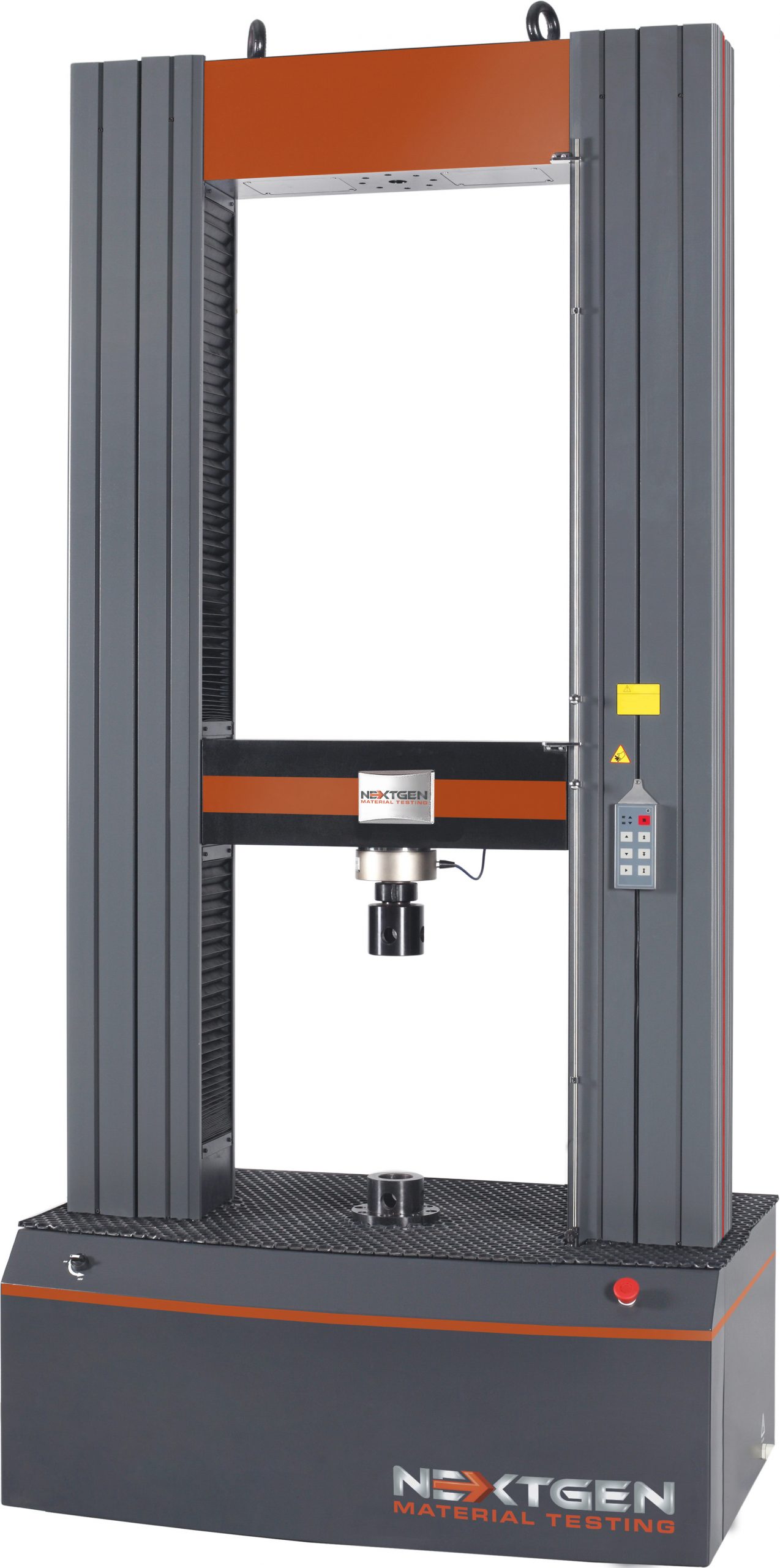 Electromechanical Universal Testing Machines use electric motors and mechanical systems to apply forces to test samples. The force is typically generated through lead screws or ball screws driven by servo motors. These motors provide precise control over the movement of crossheads to which test fixtures or grips are attached. During testing, this setup provides an accurate force and displacement application.
Electromechanical Universal Testing Machines use electric motors and mechanical systems to apply forces to test samples. The force is typically generated through lead screws or ball screws driven by servo motors. These motors provide precise control over the movement of crossheads to which test fixtures or grips are attached. During testing, this setup provides an accurate force and displacement application.
These machines are versatile and can handle both small and large load testing. They are suitable for an array of materials including metals, plastics, and composites. Such testers are commonly used in quality control, research, and educational environments due to their ability to perform various types of tests such as tension, compression, bend, peel, tear, and shear tests.
Electromechanical UTMs are highly precise and repeatable. This is often enabled by modern load cells and data acquisition systems that record and analyze the specimen’s force and deformation during testing. These machines typically offer a range of testing speeds and can be configured to test samples under cyclic or static loads, depending on the requirements of the test standard or experimental setup.
Modern electromechanical UTMs use advanced technologies such as digital controls, touchscreen interfaces, and software. You can customize test parameters, real-time monitoring, and detailed test results analysis. Hence, this improves the user experience, increasing operational efficiency, and making test results more accurate.
Advantages of Electromechanical UTMs
-
Precision and Accuracy: Electromechanical UTMs provide high precision in the control of test conditions, which is essential for repeatable and reliable test results.
-
Speed and Efficiency: These machines are capable of rapid testing cycles with less preparation time needed between tests, thus increasing laboratory throughput.
-
Versatility: They can accommodate a broad range of materials, from metals and plastics to composites, and are suitable for a number of tests including tension, compression, bend, and shear tests.
-
Ease of Use: Often equipped with advanced software and digital controls, these machines allow for straightforward setup and operation, making them accessible to users of all skill levels.
-
Lower Maintenance Needs: Compared to hydraulic systems, electromechanical systems generally require less maintenance, which leads to lower operating costs over time.
Disadvantages of Electromechanical UTMs
-
Limited Force Capacity: While suitable for a range of applications, they typically cannot achieve the high force levels of servo-hydraulic machines, which may be necessary for testing very high-strength materials.
-
Cost: Electromechanical UTMs can be more expensive than other types due to precision components and technology.
-
Wear and Tear: Although robust, mechanical parts such as screws and gears can wear over time, particularly under continuous heavy use, which may affect long-term accuracy and reliability.
-
Sensitivity to Environmental Conditions: These machines can be sensitive to environmental conditions like temperature and humidity, which can influence the accuracy of test results if not properly managed.
Servo-Hydraulic Universal Testing Machines
Servo-hydraulic Universal Testing Machines are advanced systems designed for dynamic and high-load testing applications. These machines make use of hydraulic actuators to apply precise load and displacement through a servo valve controlled by a digital feedback system, providing both static and dynamic testing capabilities.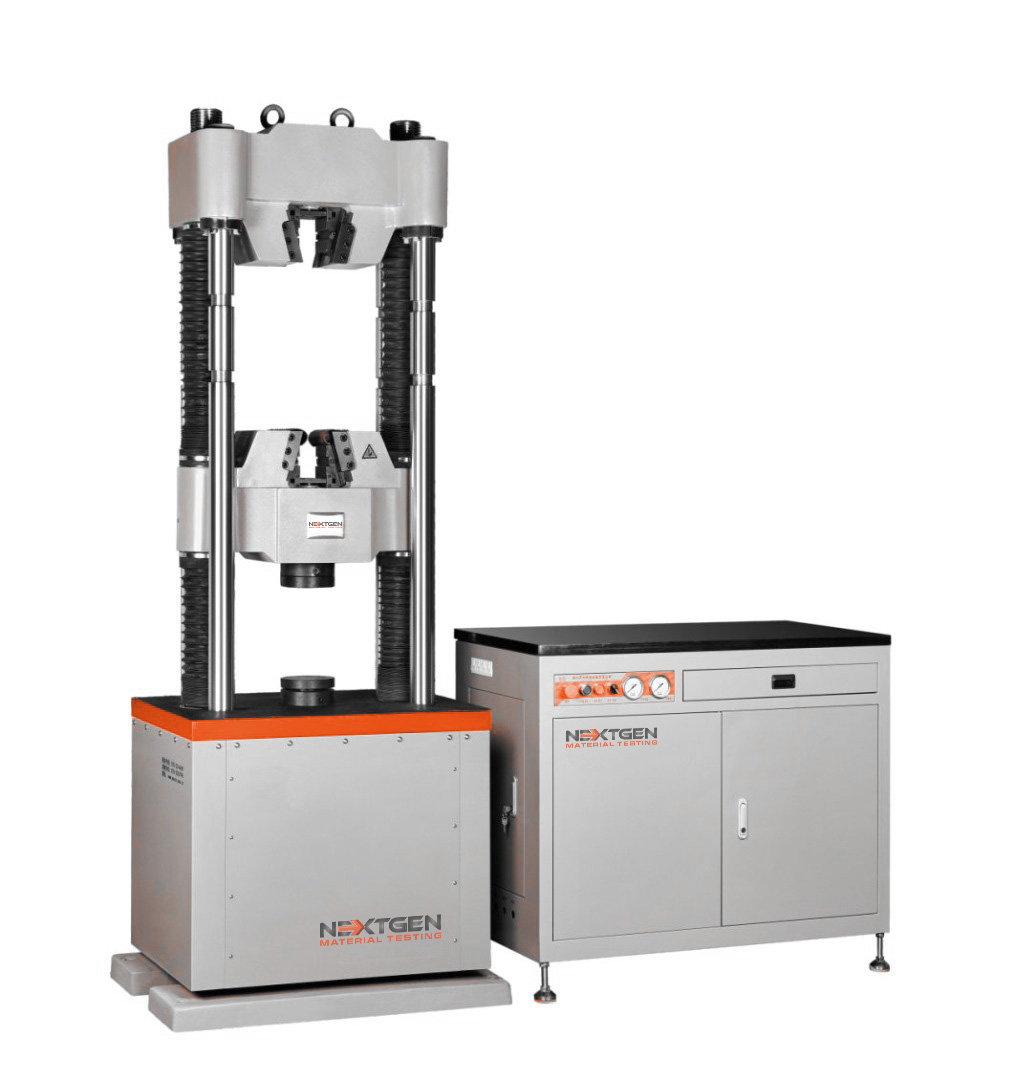
Servo-hydraulic UTMs are recognized for their robust construction and high load capacity, making them ideal for testing materials that require large forces, such as metals and composites. The core of these machines is a hydraulic power unit that drives a piston within a cylinder to generate force. This design allows for the application of both tensile and compressive forces in a range of testing scenarios, from slow static tests to high-frequency fatigue tests.
These machines are equipped with state-of-the-art technology including servo valves that allow for smooth and precise control of test parameters. They can perform a range of tests such as fatigue, fracture mechanics, and multi-axis simulations. Modern servo-hydraulic UTMs feature user-friendly interfaces, often with touchscreens and digital controls, making them easier to operate and more accessible to a greater number of users. The systems also include advanced software for data acquisition, control, and analysis, providing detailed insights into material behavior under different loads and conditions.
Servo-hydraulic UTMs are flexible in their testing capabilities, with the ability to handle demanding tests like high-speed tensile tests, cyclic loading, and complex loading patterns that simulate real-world conditions. They are commonly used in industries where understanding materials’ durability and performance under dynamic stresses plays a key role.
Recent models of servo-hydraulic UTMs feature increased environmental and energy efficiency. Innovations such as hybrid hydraulic units significantly reduce power consumption and hydraulic fluid use, aligning with modern sustainability standards. These enhancements lower operational costs and decrease the environmental impact of testing processes.
Advantages of Servo-Hydraulic Universal Testing Machines
-
High Load Capacity: Servo-hydraulic systems generate very high forces, making them ideal for testing materials that require large loads, such as metals and composites.
-
Dynamic Testing Capabilities: These machines excel at dynamic and fatigue testing, capable of handling pulsating, cyclic, and impact loads, which are essential for assessing materials’ durability and lifespan under real-world conditions.
-
Precision Control: The use of servo valves in these systems allows for precise control over loading conditions, resulting in accurate and repeatable results, essential for quality control and research applications.
-
Versatility: They are suitable for a broad spectrum of tests, including tensile, compression, bend, and shear tests in a broad selection of materials.
-
Robustness for Harsh Environments: Servo-hydraulic UTMs are designed to operate effectively in harsh testing environments.
Disadvantages of Servo-Hydraulic Universal Testing Machines
-
Higher Initial and Maintenance Costs: These machines generally involve higher initial costs and ongoing maintenance expenses than other types of testing machines. Hydraulic systems require regular maintenance to operate efficiently.
-
Complexity: Servo-hydraulic systems can be more complex due to hydraulic components and precise control systems. You might require trained personnel to operate and maintain.
-
Energy Consumption: Servo-hydraulic UTMs can be energy-intensive, primarily due to the power required to maintain hydraulic pressure, a consideration for organizations aiming to reduce energy use.
-
Noise Levels: Hydraulic pumps and actuators typically generate more noise than electromechanical systems.
Comparison of Electromechanical and Servo-Hydraulic UTMs
Electromechanical UTMs are driven by electric motors and used in medium- to high-force applications. They are highly favored for their precision, ease of use, and speed. These machines are capable of performing a range of tests including tension, compression, and flex tests on many types of materials like plastics, metals, and composites. Electromechanical systems are known for their lower maintenance costs and quieter operation, making them suitable for laboratory environments where space and noise could be a concern.
On the other hand, Servo-Hydraulic UTMs excel in applications requiring very high force and dynamic testing. These machines use hydraulic actuators to apply loads and perform complex tests such as fatigue, fracture mechanics, and multi-axis simulations. Servo-hydraulic machines are noted for their robustness and ability to handle larger and more rigorous test procedures, often required in industries like aerospace, automotive, and construction. Despite their high power and versatility, these systems generally involve higher initial costs, greater energy consumption, and more intensive maintenance.
Both types of machines offer advanced features like precise load and displacement control, high data accuracy, and flexibility with test parameters, facilitated by modern control systems and software. The choice between electromechanical and servo-hydraulic systems largely depends on your specific test requirements, including the nature of the materials to be tested, the types of tests required, environmental factors, and budget constraints.
Electromechanical systems may be preferable for labs needing efficient, accurate, and versatile machines with lower operating costs and less maintenance. Contrarily, servo-hydraulic systems might be the better choice for higher force applications and more complex dynamic testing where the additional investment in cost and maintenance can be justified by the need for high-capacity testing capabilities.
Examples of Advanced UTMs
NextGen, a leader in the material testing industry, specializes in advanced material testing equipment. We provide a comprehensive range of solutions to meet diverse testing needs. Our catalog includes both electromechanical and servo-hydraulic Universal Testing Machines.
Whether you are looking for a system capable of precise low-force measurements or one that can handle high-capacity, dynamic testing, our selection will include a machine that meets your specifications. We invite you to explore our UTMs’ advanced features and capabilities. If you are considering an electromechanical or servo-hydraulic UTM, you might find the following insights particularly interesting.
Electromechanical Universal Testing Machine – EML Class A Series
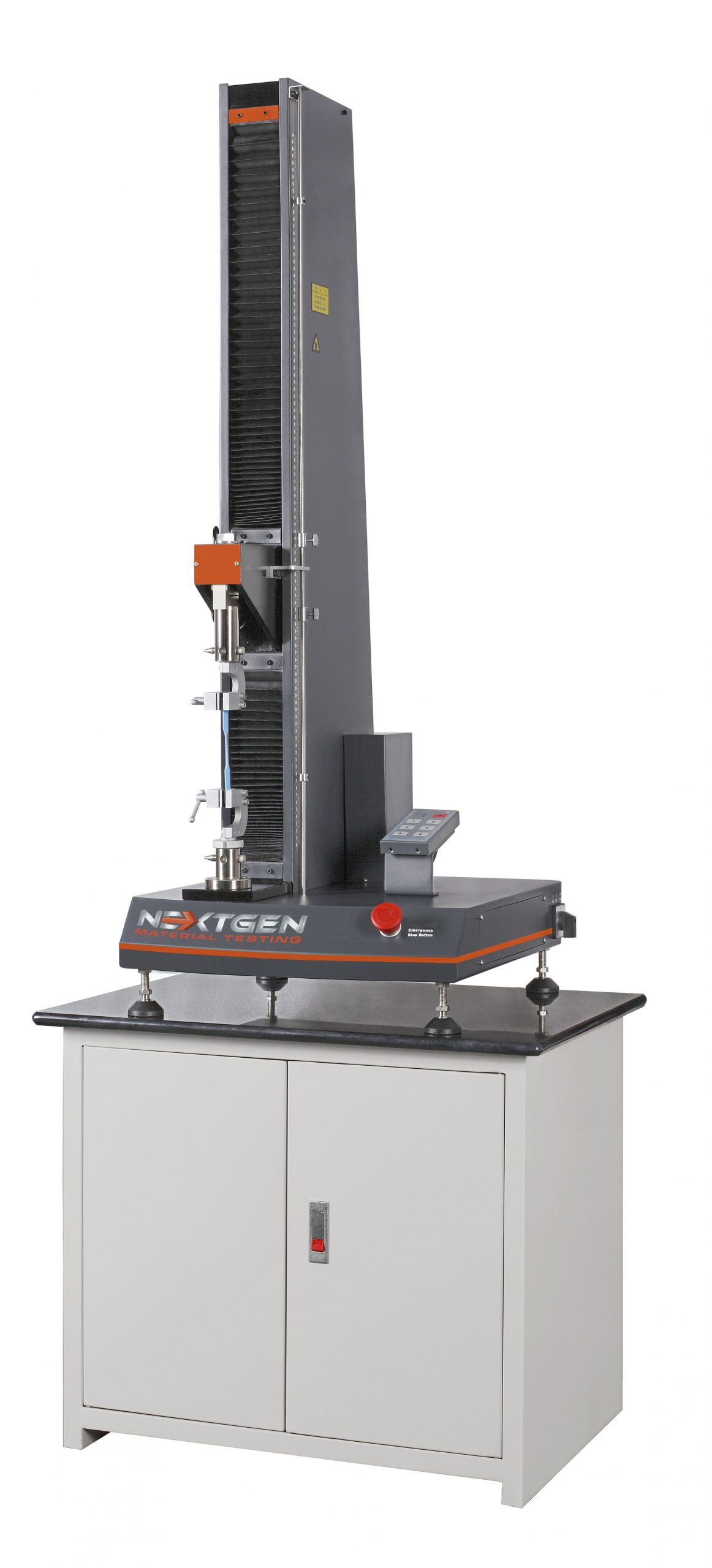 The NG-EML Single Column Bench Top Universal Testing Machine sets the bar for user-oriented design and engineering within the electromechanical testing industry. Designed specifically for routine and standardized tests, this machine combines high-quality construction with affordability, making it an excellent choice for laboratories where space and budget are considerations.
The NG-EML Single Column Bench Top Universal Testing Machine sets the bar for user-oriented design and engineering within the electromechanical testing industry. Designed specifically for routine and standardized tests, this machine combines high-quality construction with affordability, making it an excellent choice for laboratories where space and budget are considerations.
With a force capacity ranging from 50N to 5kN, the NG-EML handles an array of materials including plastics, fine wire, fibers and threads, biomaterials, thin films, and more. This makes it ideal for quality control and production testing of small and delicate items.
The single-column, table-top configuration of the NG-EML does not just save space – it increases functionality in testing environments. It is equipped with high-speed, low-vibration electromechanical drives and precision, pre-loaded ball screws to provide smooth and precise movement. Linear motion guides further enhance alignment, a critical factor for accurate testing outcomes.
Accompanied by easy-to-use software that includes a pre-programmed library of industry standards (ASTM, ISO, DIN, EN, BS, and more), the NG-EML simplifies the testing process, allowing for versatility without extensive user training. This feature is complemented by high-resolution, digital closed-loop controls integrated directly into the load frame. This automates many testing parameters, thus improving both ease of use and safety with automatic limit checking for crosshead position, overload, and other important variables.
The testing space is protected by robust construction, which guarantees device longevity even under rigorous use. This durability, combined with stocked consumables and spares, trusted after-sales support, and a lifetime product support advantage, positions the NG-EML as a reliable long-term investment for testing laboratories.
Servo-Hydraulic Testing Machine – NG-SHM Class DP
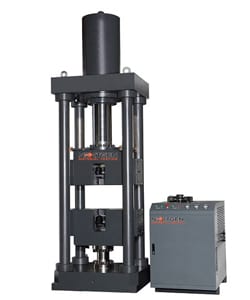 The NG-SHM Class DP series offers a powerful solution for high-force mechanical testing within the servo-hydraulic UTM category. This system is designed to handle a broad array of materials from various industries, with applications ranging from fasteners and rebar to chains, welds, and castings.
The NG-SHM Class DP series offers a powerful solution for high-force mechanical testing within the servo-hydraulic UTM category. This system is designed to handle a broad array of materials from various industries, with applications ranging from fasteners and rebar to chains, welds, and castings.
The Class DP has a side-action hydraulic wedge grip and an actuator positioned above the unit. This configuration allows for the execution of multiple types of tests including tension, compression, bending, and shearing in a single zone. The system’s force capacity options – 600kN, 1000kN, and 2000kN – enable it to handle extraordinarily high loads, making it suitable for heavy-duty applications.
Key to the NG-SHM Class DP series’ performance is its upper actuator’s excellent axis alignment and shock absorption properties, which also simplify adjustments to the testing space. Hydraulic tensile grips have high gripping performance, essential for testing high-strength materials. Moreover, the long-travel double-acting cylinder is adaptable to a range of specimen sizes, supported by a one-body forged piston and rod that provides optimal sealing and repeatability.
The robust and precise guidance system protects the cylinder from lateral forces, thereby extending the lifespan of its components. This system also incorporates an I-shaped force transducer known for its linearity and stability. Additionally, a high-quality encoder ensures precise displacement measurements and control.
The servo valve of the NG-SHM Class DP series significantly improves machine response accuracy and is straightforward to maintain. The machine’s motor is another highlight, recognized for its efficiency, energy-saving features, high starting torque, and reliability, contributing to the machine’s overall low noise, minimal vibration, and easy maintenance.
Concluding Thoughts on Electromechanical vs. Servo-Hydraulic UTMs
When it comes to material testing, both electromechanical and servo-hydraulic universal testing machines present an array of capabilities suited to different testing requirements. Electromechanical UTMs are particularly valued for their precision and repeatability in tests requiring lower force ranges, making them ideal for laboratory environments that handle metal, plastics and composite testing. Their low maintenance and ease of use make them suitable for frequent testing applications.
In contrary, servo-hydraulic UTMs excel in high-load and dynamic testing environments, such as those needed in the aerospace and automotive industries. These machines are adept at handling rigorous tests involving large forces and are especially suited to fatigue, fracture mechanics, and multi-axis simulations.
The NG-EML Single Column Bench Top and the NG-SHM Class DP series are just examples of the extensive range of UTMs offered by NextGen Material Testing Inc. These models illustrate the flexibility and advanced capabilities of our product lines, which also include specialized machines for rubber testing, plastic testing, and servo-hydraulic static testing among others. For more information on our full range of electromechanical and servo-hydraulic UTMs, you can explore our dedicated product pages.
At NextGen Material Testing Inc., we are committed to assisting you with all your material testing needs. Whether you require detailed advice on selecting the right equipment or need comprehensive support services, our team is ready to help. Feel free to contact us directly or request a quote to address any questions or requirements you might have regarding our products and services. Your success in material testing is our priority, and we look forward to providing you with the solutions you need to achieve it.
